I have a confession to make. I used to be a compulsive dieter. Despite having a fairly normal body weight all of my life, I used to constantly watch what I ate and interpret any weight gain as personal failure. That is, until I started studying to be a dietitian.
If the last three years at school have taught me anything, it’s that diets almost always fail. And usually, they are not that good for you.
So how does your body react to dieting and why is this bad for your health? And how come most diets fail? Let’s get started.
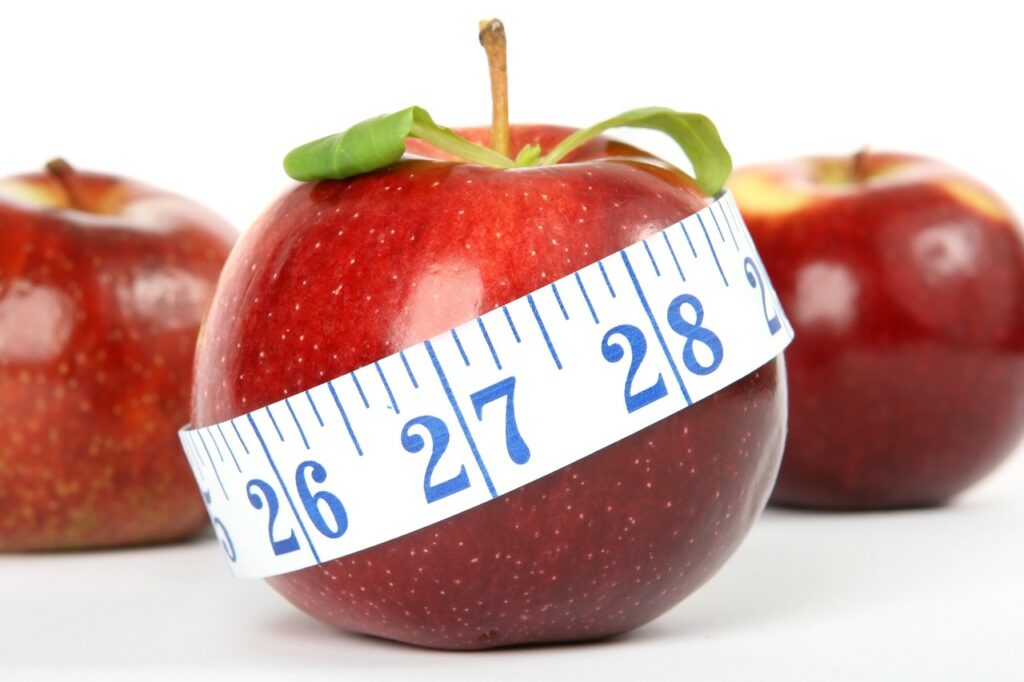
What do I mean by “dieting”?
The concept of dieting can mean different things to different people. When nutritionists talk about your diet, we are referring to the things you eat on a regular basis, whether or not you are trying to lose weight. But when we talk about “dieting”, usually we mean some form of restrictive eating aimed at weight loss. In most of the research, dieting behaviour is measured by asking people about certain behaviours such as limiting the amount or type of foods they eat, exercising, and fasting. In this article, when I talk about dieting, I am referring to these types of behaviours. I especially want to focus on the more extreme types of diets – those that cut out whole food groups and those that really limit the number of calories you take in.
First, some basics
Calories in and calories out
Calories are units of energy. We get calories when we eat food, which gets broken down in our digestive tracts, absorbed into our bodies, and used as fuel. We constantly use energy in the form of calories for our every-day functioning. Even when you are sitting or lying still, your heart is beating, your lungs are taking in air, your kidneys are filtering out waste, and so on. All of these functions are required for your survival, and they also require energy (in the form of calories). The energy required for all of these basic functions is called your basal metabolic rate. Your basal metabolic rate is the number of calories your body needs to function at rest. We use even more calories on top of that when we are doing active things, like walking, running, grocery shopping, cleaning, etc.
Whether we maintain, lose, or gain weight all depends on how many calories we are taking in versus using up. If we take in more calories than we use, we gain weight. If we take in less calories than we use, we lose weight. If they are approximately equal, that is called energy balance, and that means we maintain our weight.
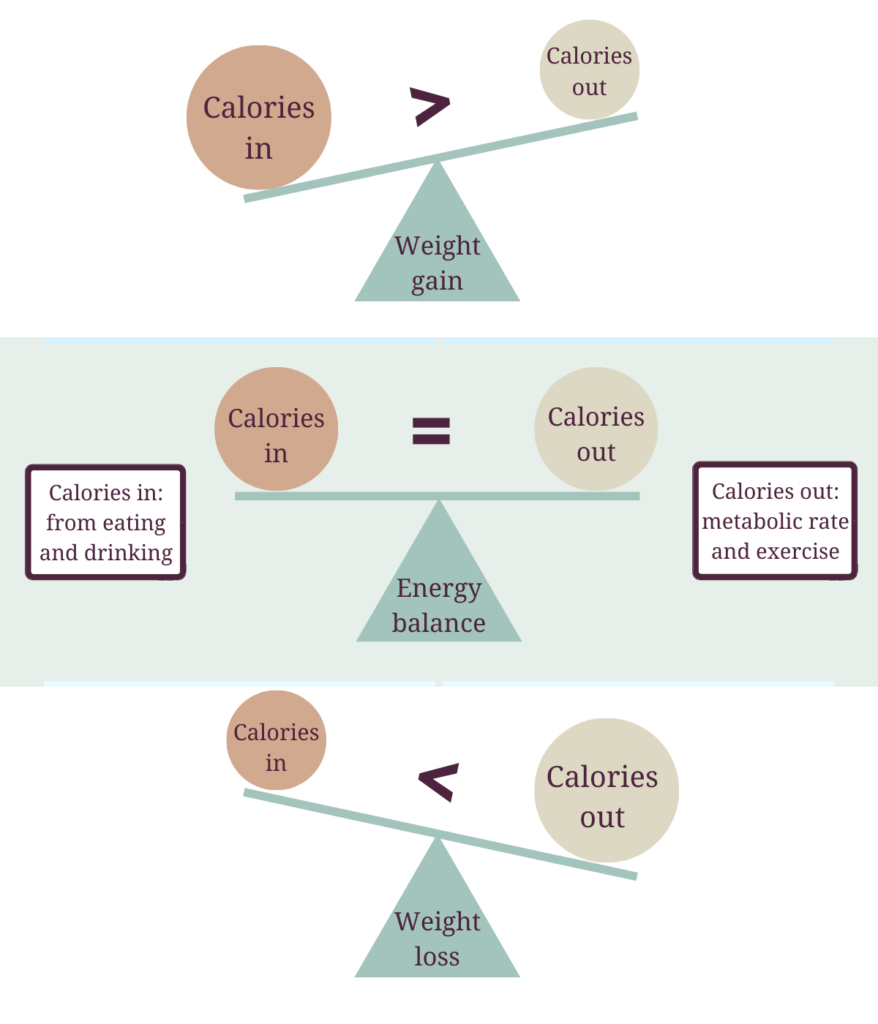
By limiting the number of calories you take in, diets lead to weight loss. Some diets also require you to exercise, which increases the number of calories you use up, which can also lead to weight loss. So the basic concept behind ALL diets is the exact same. However, many diets also eliminate certain foods or food groups. For example, the keto diet almost completely eliminates carbohydrates. Other types of diets are all about the timing of food intake, like intermittent fasting. We will not get into the specifics of these various fad diets but suffice it to say that at the end of the day, they all work the same way. They get you to take in less energy than you use.
Energy storage in the body
Our bodies have evolved to deal with food shortages by having energy stored in different ways inside our bodies. This is why we can go almost a month without eating. When we go on a diet or start fasting, the first type of energy storage that our bodies tap into is called glycogen. Glycogen is stored in our muscles and liver and is basically a large string of sugar molecules. It’s a very easy source of energy for our bodies, which is why it is used first. Glycogen doesn’t last very long, especially when we fast, which is why our bodies also store energy in the form of fat. We all have fat stores, even if we are very skinny. This fat has a lot of calories in it and the body can slowly break it down and use it for energy. Lastly, our body can also break down muscles to use for energy, and it usually does this when we first start fasting or dieting, but then eventually stops doing this. The breakdown of muscles is not something that can go on for long since we need our muscles to survive.
4 reasons not to diet: what happens to your body on a restrictive diet
The issue with many fad diets is that they tend to be very restrictive. Any time you cut out whole food groups or consume substantially less calories than your body needs, there will be consequences. Below I will be explaining how your body reacts to extreme dieting and what some of the consequences may be.
1. Nutritional deficiencies
One of the most common issues with extreme diets is nutritional deficiencies, which is when the body doesn’t get enough of one or more important nutrients. This depends on the type of diet you choose to follow. If you choose to cut out high calorie foods that are not nutrient-dense (things like chips, candy, etc.), but keep a variety of nutrient-dense options (things like grains, legumes, fruits and vegetables), you probably won’t experience nutritional deficiencies. However, if you choose to cut out whole food groups or really restrict your caloric intake, which many fad diets require, you might experience deficiencies.
These deficiencies may cause health problems. For example, being on a prolonged ketogenic diet may lead to deficiency in B vitamins because these are commonly found in grain products, which the diet cuts out. Depending on the vitamin you are lacking, you may experience symptoms such as fatigue, anemia, or a compromised immune system. You may also experience loss of electrolytes like potassium, which is important for nerve and muscle cell functioning.
2. Loss of muscle mass
When you start a new restrictive diet, especially one that is very low in calories, you tend to experience very fast weight loss in the first few weeks. This makes you feel like the diet is working! But in reality, what you tend to lose is muscle and water. This happens because the body chooses to break down muscle and glycogen rather than fat. Both muscle and glycogen have a lot of water in them, so when you lose them you also lose water. However, once you start eating normally again, your body will remake that glycogen, and some of that muscle, which will cause you to regain all of that weight.
If you go on repeated dieting cycles, your body won’t be able to remake the muscle that you lost. This is especially true if the type of dieting you do is extreme and cuts out a lot of calories. Extreme low-calorie diets that lead to very rapid weight loss actually cause more muscle mass loss than less extreme diets. We need muscle in order to function, and losing muscle over time, especially if you diet on and off, can make you less strong and lower your functional capacity over time. Muscle is also very metabolically active, meaning it burns a lot of calories. As you lose muscle, you burn less calories and your basal metabolic rate slows down, so the “calories out” part of the equation becomes smaller. This means that once you go back to eating normally, your body will be burning less calories, and you may end up gaining MORE weight.
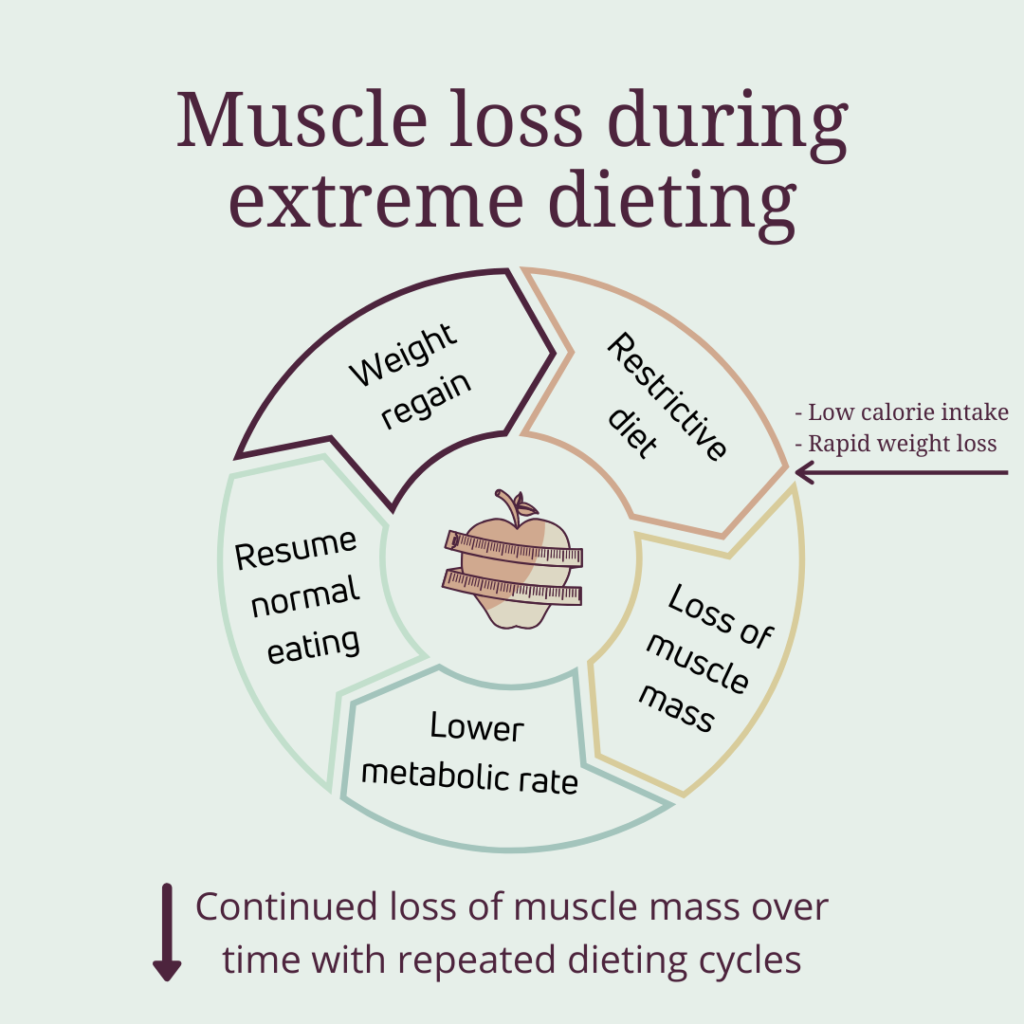
3. Hormonal changes
Your body doesn’t like to lose weight. The way it fights weight loss is partially through your hormones. Hormonal changes during weight loss are aimed at getting you to eat and regain the weight. Let’s do a quick review of some of these changes.
Thyroid hormone
There are two thyroid hormones (T3 and T4), and these are involved in controlling your basal metabolic rate. When you have high levels of these hormones, your body burns more calories (your basal metabolic rate is high). Research shows that taking in less calories results in lower levels of thyroid hormones, which may contribute to a lower basal metabolic rate, meaning that the “calories out” part of your equation is lower. This makes it easier to regain weight once you start eating more calories.
Cortisol
This hormone is also called the “stress hormone” because it tends to be higher in times of stress. Higher cortisol tells your body that it should store energy because bad times may be ahead. Basically, it stimulates weight gain. Reduction in food intake has been shown to lead to higher cortisol levels, which tell your body to eat more and put on the weight.
Leptin
This hormone is produced by your fat cells. It is there to regulate fat storage and your food intake. Leptin inhibits your hunger, so the more leptin you have circulating in your body, the less hungry you feel. When you restrict your intake, leptin levels fall, causing you to feel hungry.
Stomach and gut hormones
There are a variety of hormones made by your stomach and intestines that are meant to regulate your hunger. These are profoundly affected by a reduction in caloric intake. Basically, there is an increase in hormones that tell you that you’re hungry, and a decrease in hormones that tell you that you’re full. The result? A constant feeling of hunger and an increase in appetite.
Hormonal changes: the bottom line
All of these changes lead to some interesting effects on hunger, appetite, and energy storage. It seems that weight loss increases not only appetite, but also the feeling of reward associated with food. People who have lost weight report being especially drawn towards high-calorie foods. Because these hormonal changes also lower your basal metabolic rate, they make it easier to put on more weight with less food intake.
4. Psychological consequences
I am no expert in this area, but I think it’s important to mention the psychological toll of repeated dieting cycles, especially fad diets. Fad diets are often marketed as easy solutions, requiring no effort on behalf of the consumer. But fad diets fail, and that can leave you feeling like a failure yourself.
In general, any restrictive diet is hard to stick to. This means that you use a lot of your energy to try to stick to it, only to eventually “break”. This makes you feel guilty, which in turn leads you to try again. Repeated cycles of attempting and failing to control your eating can lead to psychological issues such as eating disorders and low self-esteem.
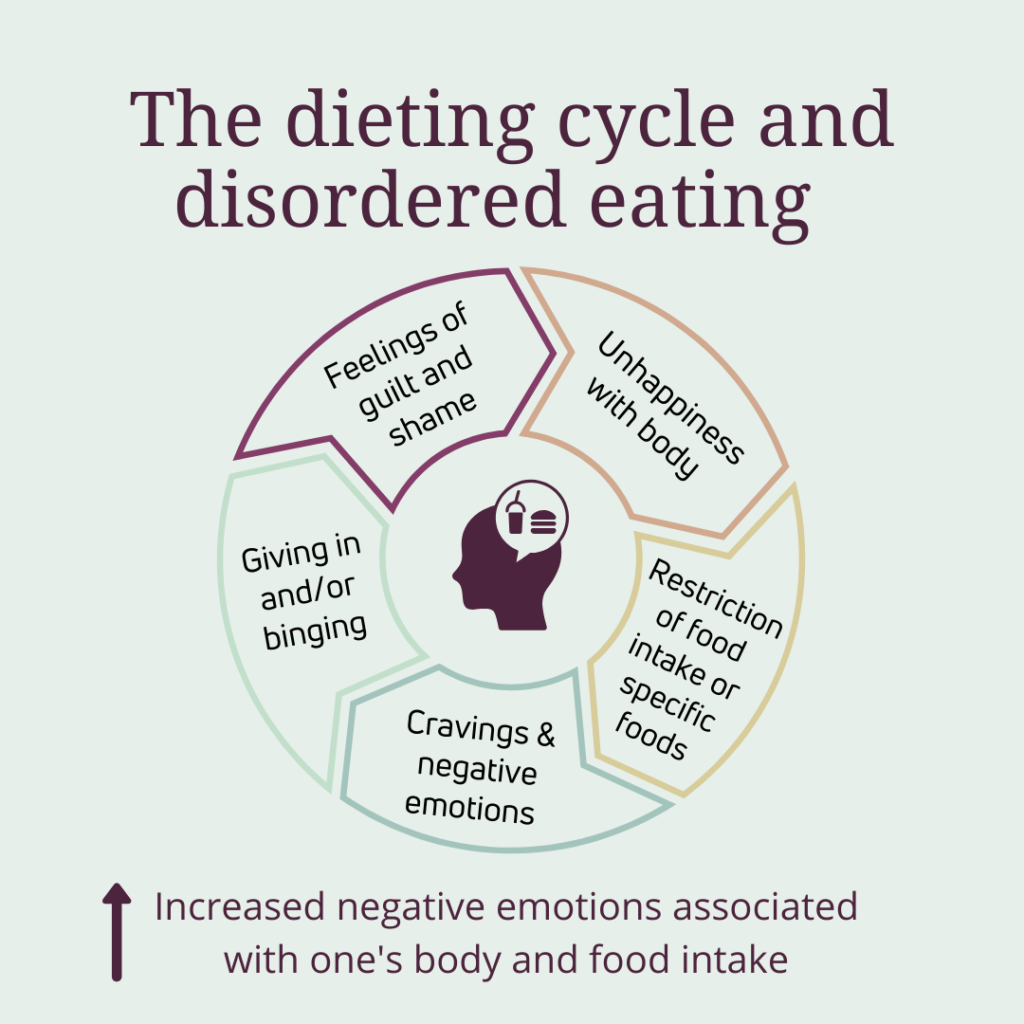
This cycle has been expanded on by the intuitive eating movement, which is all about breaking the dieting cycle. I hope to have a full article dedicated to intuitive eating soon!
The health effects of weight cycling
The four phenomena listed above explain why many dieters experience weight cycling. They lose the weight while dieting only to regain it once they stop the diet. Some studies show that most dieters regain the weight within 2 to 5 years.
There is evidence that weight cycling can be bad for your health. Research shows that people who weight-cycle may have worse heart and bone health. Some studies even show that people who diet regularly have more of an increase in BMI, fat mass, and waist circumference over time than those who do diet. Clearly, on and off dieting is not the answer.
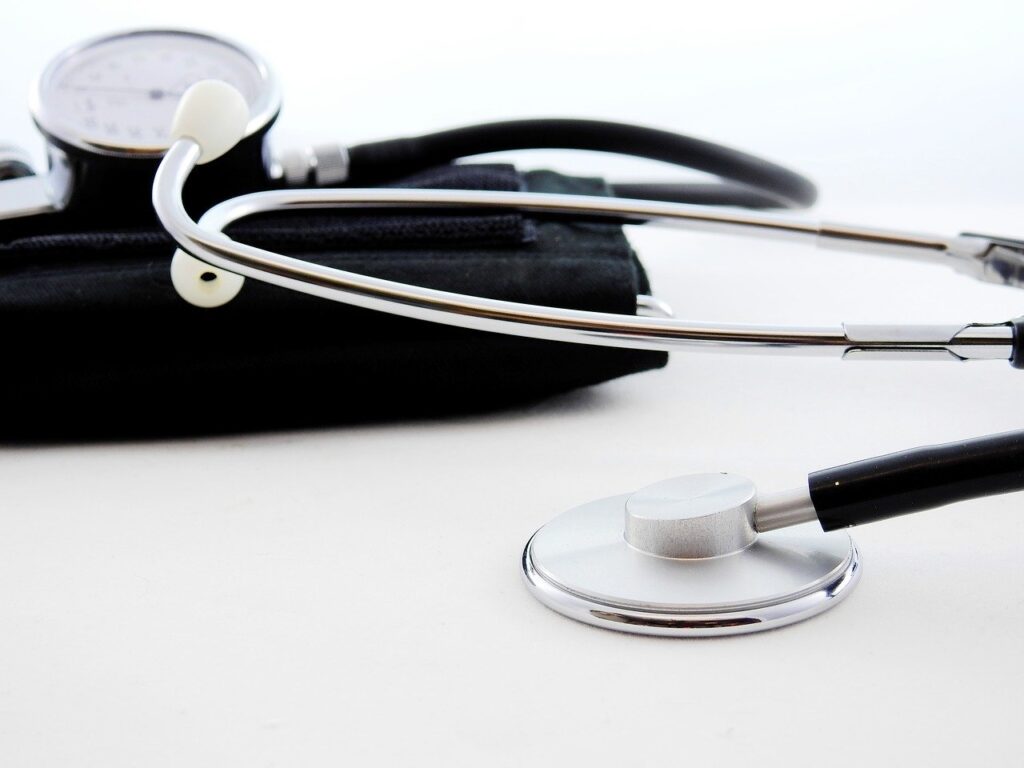
But what if I want or need to lose weight?
What if you want to lose weight in order to feel healthier, or your doctor told you that it’s important to your health? I don’t want to turn you off of dieting altogether because sometimes losing weight can have important health benefits. There are certain steps you can take to make sure you diet in a healthy way.
1. Variety and moderation
It is important to eat everything in moderation, with no outright restrictions on certain foods or extreme calorie deficits. This would ensure you are not missing out on any important nutrients. You can follow Canada’s Food Guide in order to understand what your plate should look like.
2. Limit muscle loss
There are things you could do to minimize muscle loss while you lose weight. First, try to only mildly lower your calorie intake, while increasing your protein intake. More protein will help your body retain and rebuild muscles. It’s also important to exercise often (both cardio and weights) in order to maintain your muscles. It is best to see a dietitian when starting a new weight loss regimen because he/she can help calculate how much calories and protein you would need, as well as make sure your diet is balanced.
3. Be prepared to play the long game
Be prepared for it to take a while. Slow and steady is best when it comes to weight loss. That’s why it’s so important to make changes you can stick to long-term. You should also be prepared to eventually hit a plateau, which happens because your body is fighting the weight loss using all of the tricks I explained above. A registered dietitian can help you manage a plateau.
4. Be kind to yourself
Now that you know how hard your body fights weight loss, it may be easier to be compassionate towards yourself when the weight doesn’t come off easily. Don’t think of it as personal failure, but more as a roadblock that you can overcome.
When it comes to maintaining your mental wellbeing, I think it’s important to remember that overall health is more important than the way you look. Focusing away from your weight/shape and towards health means you can stop obsessing over every single pound gained or lost. This is a very difficult message to internalize and I understand that not everyone can get there. I personally have constantly struggled with this. But it’s important to try to treat your body with the respect it deserves, no matter what shape or size it is.
The bottom line
- Avoid fad diets!
- If you decide to change the way you eat, make changes that make you feel good and that you can stick to long-term.
- If you can, try to shift your attention from your weight to your overall health and wellbeing.
References
- Cava, E., Yeat, N. C., and Mittendorfer, B. (2017). Preserving Healthy Muscle during Weight Loss. American Society for Nutrition, 8, 511-519. doi:10.3945/an.116.014506.
- Hohman, E. E., Balantekin, K. N., Birch, L. L., and Savage, J. S. (2018). Dieting is associated with reduced bone mineral accrual in a longitudinal cohort of girls. BMC Public Health, 18, 1285-1295. https://doi.org/10.1186/s12889-018-6206-y.
- Kakinami, L., Knäuper, B., & Brunet J. (2020). Weight cycling is associated with adverse cardiometabolic markers in a cross-sectional representative US sample. Epidemiol Community Health, 0, 1–6. doi:10.1136/jech-2019-213419.
- Mackiea, G. M., Samocha-Bonet, D., and Tam, C. S. (2017). Does weight cycling promote obesity and metabolic risk factors? Obesity Research & Clinical Practice, 11, 131-139. http://dx.doi.org/10.1016/j.orcp.2016.10.284.
- Rossi, A. P., Rubele, S., Calugi, S., Caliari, C., Pedelini, F., Soave, F., Chignola, E., Bazzani, P. V., Mazzali, G., Grave, R. D., and Zamboni, M. (2019). Weight Cycling as a Risk Factor for Low Muscle Mass and Strength in a Population of Males and Females with Obesity. Clinical Traisl and Investigations, 27(7), 1068-1075. doi:10.1002/oby.22493.
- Sares-Jäske, L., Knekt, P., Männistö, S., Lindfors, O., and Heliövaara, M. (2019). Self-report dieting and long-term changes in body mass index and waist circumference. Obesity Science & Practice, 5(4), 291-303. doi:10.1002/osp4.336.
- Sumithran, P and Proietto, J. (2013). The defence of body weight: a physiological basis for weight regain after weight loss. Clinical Science, 124, 231-241. doi:10.1042/CS20120223.
- Tomiyama, A. J., Ahlstrom, B., and Mann, T. (2013). Long‐term Effects of Dieting: Is Weight Loss Related to Health? Social and Personality Psychology Compass, 7(12), 861-877. https://doi.org/10.1111/spc3.12076.

One Reply to “4 Reasons to Quit Dieting (and What You Could Do Instead)”
Comments are closed.